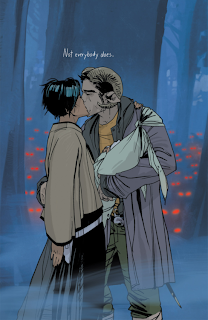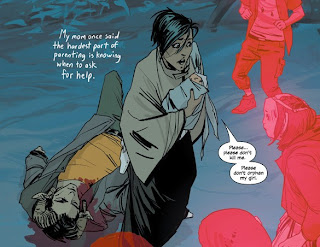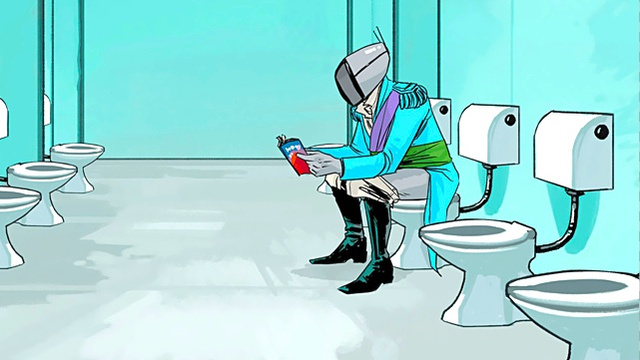What can I say about Saga? Well, it’s a comic. A semi-indie
comic, by which I mean that it’s still published by a major publisher and
written by a very well known (to comics nerds) writer, Brian K. Vaughn. And
everyone in the industry is fawning over it. And Fiona Staples is both
well-respected and kind of a rockstar. But it doesn’t have any superheroes in
it, so I guess we could call it an indie.
It’s also freaking awesome.
So there’s that.
Saga is,
well, a saga. Following a pair of star-crossed lovers through an intergalactic
war as the lovers are hunted by a series of increasingly terrifying and really
well fleshed out bad guys, Saga is Romeo and Juliet writ large. If Romeo
and Juliet had lived long enough to have a baby, and happened to be aliens.
It follows the story of
Alana and Marko, members of two warring peoples. Alana’s people, who have wings
and are very technologically advanced, live on the planet Landfall, and have
formed the Landfall Coalition. Marko’s people use magic and sometimes have
horns, and live on Landfall’s satellite, Wreath. The people hate each other.
Like a lot. Like, enough that their war rages across the galaxy and has created
genocides, destroyed planets, and created an entire industry of outsourced
armies.
Alana and Marko are enemy
combatants who happen to fall in love over a simple book, a book about two
people falling in love.
Honestly, that might be my
favorite part of the whole thing.
The story in Saga is so incredibly epic. When they
were pitching it, Vaughn and Staples referred to the story as “Star Wars meets Game of Thrones”, and it fits. You’re not just following the
lovebirds and their adorable (occasionally omniscient narrator) daughter Hazel,
you also get views on all the different people their story touches. Like
Marko’s family and his former fiancée. Or the Robot Prince whose job it is to
bring Alana and Marko to justice at Landfall. Or the freelance mercenary hired
by Wreath to kill the lovers but take the child, who can’t help but go back and
rescue a victim of sex-trafficking even though he’s on the job and a vicious
killer.
The story’s seriously deep,
man. That’s not even the half of it. Sometimes Saga feels less like you’re reading a comic book and more like
you’re reading an extended metaphor someone created to discuss life and death
and war and industrialization and human empathy. And I don’t mean it like
that’s a bad thing. There’s a character, Isabelle, who’s literally just a
ghost, the last remnant of a people entirely wiped out by the war, and Isabelle
is still able to care. She wants to help them. She isn’t jaded or lost or
cynical, she’s angry, but she isn’t hard.
No one is one-dimensional in
this story. Absolutely no one. Not even the Lying Cat, who can literally only
say the word “Lying.” He has depth.
So why, in this sprawling
fantasy world, where princes have televisions for heads, trees can be
spaceships, and entire planets hatch into world-eating monster is my favorite
part the book? Well probably because it’s the entire point of the series.
The actual inciting incident
of all of this is a story. A simple story about two people who should by all
rights be at odds falling in love and making a world for themselves. That’s the
book Alana leaves that makes her suddenly open to the idea of falling in love.
That’s the book that shows her that Marko is actually worth talking to. That’s
the book that starts everything. And it’s the simplest thing in the world.
In the end, it’s all a
story.
I believe firmly in stories.
I believe that stories are, in a way, who we are. It’s no coincidence or accident
that I’ve basically devoted my life to them. I watch movies and read books and
write comics and tell bedtime stories and help other people tell their stories,
and I always do it for one simple reason: because stories matter. They aren't all that matter, but they are important.
The stories we tell are what
define us. The words that come out of our mouths are what reveal what we have
inside.
So it is incredibly important, deathly important, that we care for
those stories, and that we choose those stories wisely.
Now, do I agree with
everything Alana and Marko do? No. Do I think that every story is equally valid
and worth hearing? Of course not. Not all stories are created equal. But I do
believe, strongly, that stories matter.
Alana and Marko didn’t fall
in love only because they read a book. But they did fall in love because they
had the idea that they could, and that did come from the book. And sure, the
story isn’t over yet. We don’t know what their love will bring. But we do know
that it’s another story, one worth telling, and that as their story shows us the
destruction of war, the importance of family, and the saving power of love, we
can be changed for the better too.
Because of a story we read
in a book.





No comments:
Post a Comment